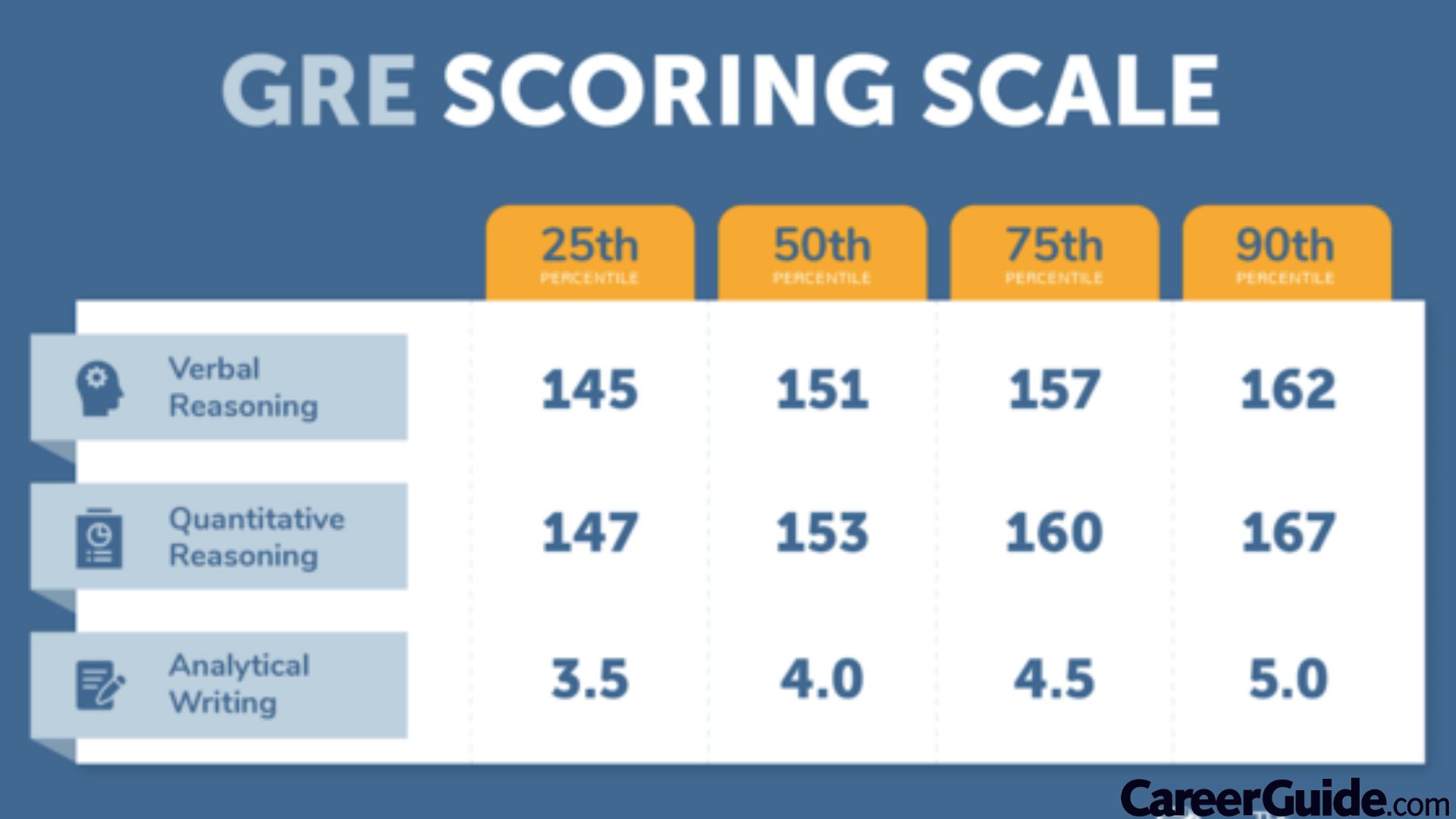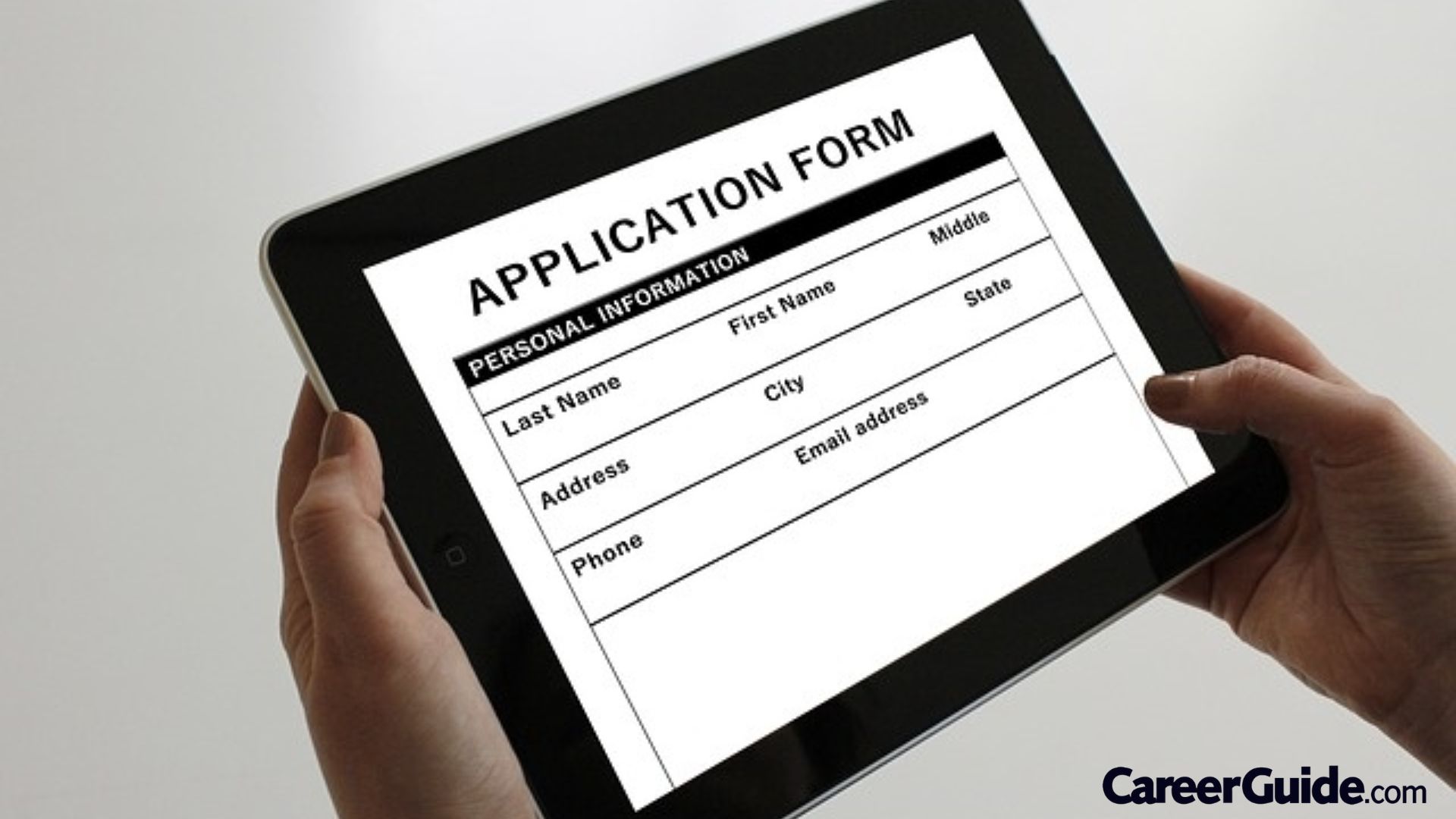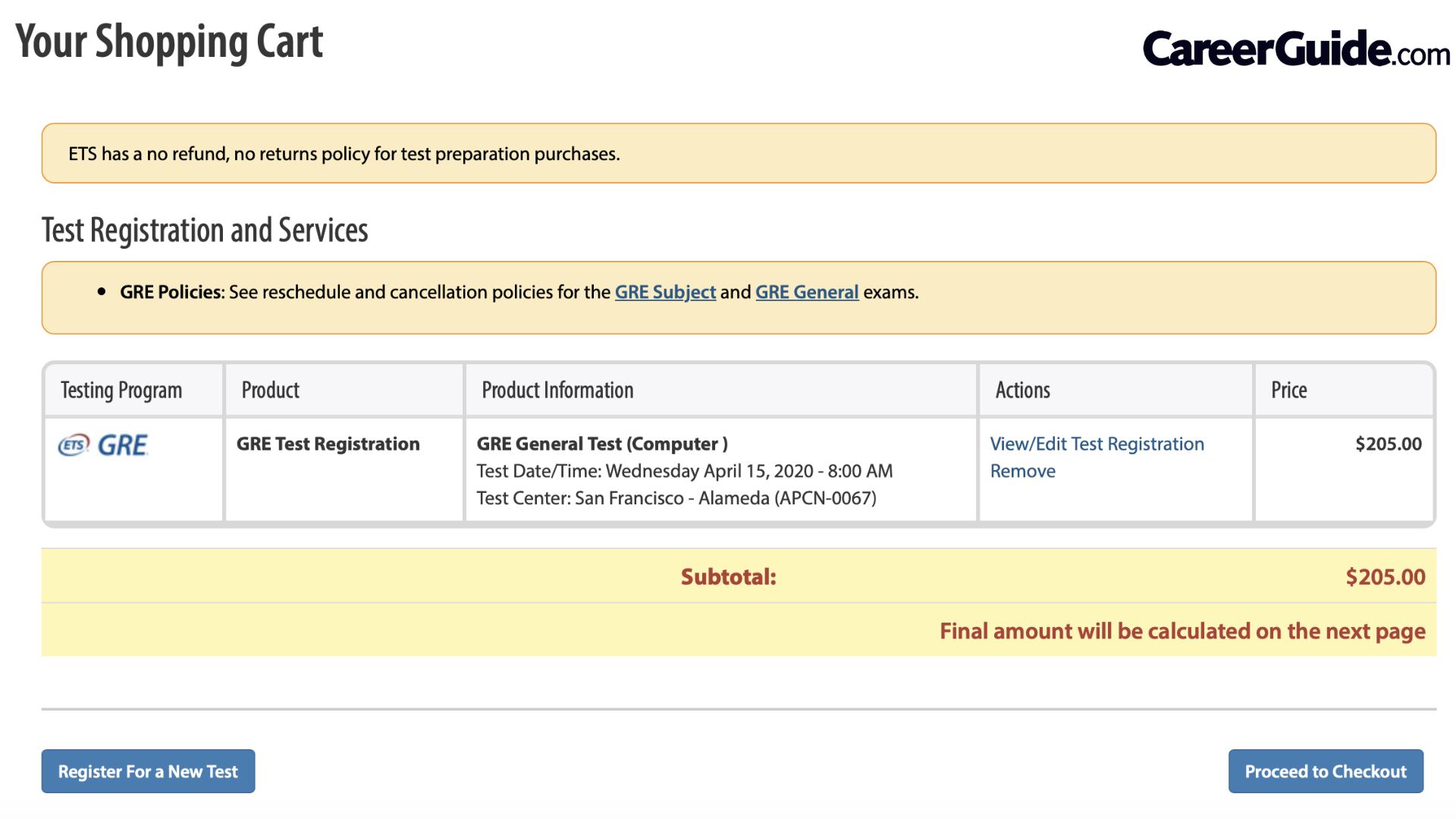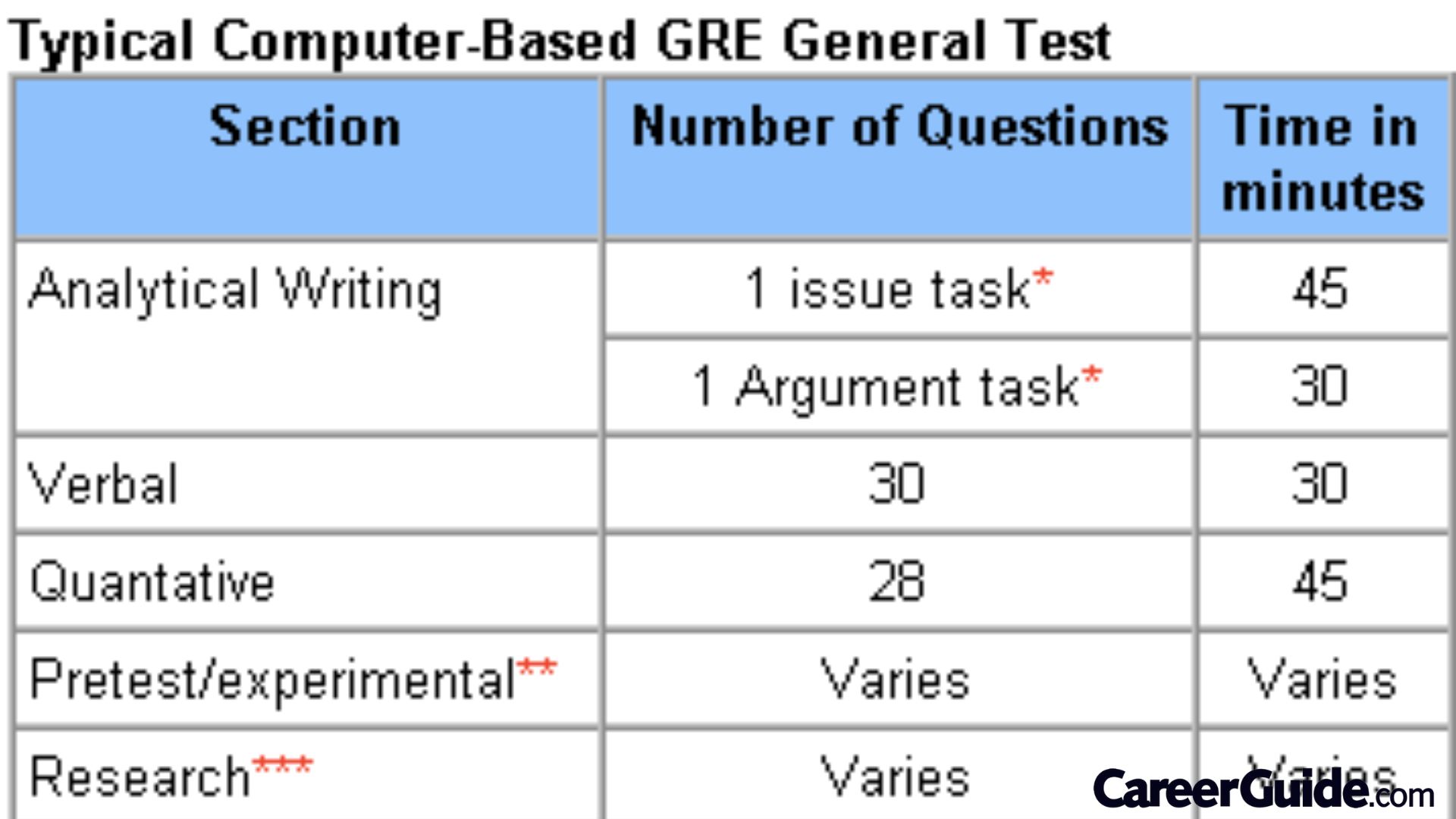- GRE Highlights
- GRE Scaled Score percentiles for General Test
- GRE Offline Registration
- Phone Registration
- Mail Registration
- GRE at Home Registration
- GRE at Home Registration
- Documents Required for GRE
- GRE General Test
- GRE General Test Registration Fee
- GRE General vs Subject Test
- GRE General Test Syllabus and Question Types
- GRE Test Duration
- GRE AWA Samples
GRE Highlights
The Graduate Record Examinations (GRE) is a standardized test that is required for many graduate school programs in the United States, as well as in other countries. The test is intended to measure a candidate’s verbal reasoning, quantitative reasoning, and analytical writing abilities. The verbal reasoning section of the GRE consists of two types of questions: text completion and sentence equivalence. Text completion questions require the test-taker to fill in one or more blanks in a sentence with the appropriate word or phrase, while sentence equivalence questions require the test-taker to select two words or phrases that will complete a sentence in such a way that the sentence is grammatically correct and makes logical sense. The quantitative reasoning section of the GRE consists of two types of questions as well: quantitative comparison and problem solving. Quantitative comparison questions require the test-taker to compare two quantities and determine which is greater or if they are equal, while problem solving questions require the test-taker to use mathematical reasoning and problem-solving skills to solve a problem. The analytical writing section of the GRE requires test-takers to write two essays: one analyzing an issue and one analyzing an argument. The issue task requires the test-taker to take a position on an issue and support that position with evidence and examples, while the argument task requires the test-taker to evaluate an argument and discuss how well the argument is supported. Overall, the GRE is a comprehensive test that assesses a candidate’s abilities in verbal reasoning, quantitative reasoning, and analytical writing. It is an important factor in determining a candidate’s suitability for graduate school programs, and as such, it is essential for candidates to prepare thoroughly for the test in order to achieve the best possible score. Additionally, it should be noted that, while the GRE is often required for admission to graduate programs in the US and other countries, it is not the only factor that is considered. Factors such as the candidate’s undergraduate GPA, relevant work or research experience, and letters of recommendation are also taken into account. Additionally, many programs will have specific requirements, such as minimum test scores or a certain number of years of work experience, that must be met before a candidate is considered for admission.
GRE Scaled Score percentiles for General Test

The Graduate Record Examination (GRE) is a standardized test that is required for many graduate school programs in the United States, as well as in other countries. The scores for the GRE are reported in several different ways, including the raw score, the scaled score, and the percentile score. The scaled score is a score that is adjusted to take into account the difficulty of the test and the performance of other test-takers. The Verbal Reasoning and Quantitative Reasoning sections of the GRE are each scored on a scale of 130-170, in one-point increments. The Analytical Writing section is scored on a scale of 0-6, in half-point increments. The percentile score, on the other hand, is a score that indicates the percentage of test-takers who scored lower than a particular score. For example, if a candidate scores in the 80th percentile, it means that they scored higher than 80% of test-takers. The percentile scores for the GRE General Test are published by the Educational Testing Service (ETS), the organization that administers the test. The percentile scores are based on the scores of all test-takers who took the test during a specific period of time. The scores are updated every year and provide a way for graduate schools to compare the scores of their applicants to the scores of all test-takers. According to the ETS, the average percentile scores for the Verbal Reasoning and Quantitative Reasoning sections of the GRE General Test are around the 50th percentile. This means that the average test-taker scores in the middle of the scale, with half of the test-takers scoring higher and half of the test-takers scoring lower. However, it’s important to note that the scores that are considered competitive for one graduate program may not be competitive for another program. The percentile scores for the GRE General Test are based on the scores of all test-takers, which includes test-takers from a variety of backgrounds and with a wide range of qualifications. Therefore, it’s important for test-takers to research the requirements of the graduate programs they are interested in and to aim for scores that are competitive for those programs. For example, a score in the 80th percentile for the Verbal Reasoning section may be considered competitive for a graduate program in English literature, while a score in the 90th percentile may be required for a graduate program in Computer Science. Additionally, different programs may have different requirements for the Verbal Reasoning and Quantitative Reasoning sections, so it’s important to research the requirements for each program separately. It’s also important to note that a good percentile score on the GRE is not a guarantee of acceptance into a graduate program. A high percentile score on the
GRE Offline Registration

In addition to online registration, test-takers can also register for the Graduate Record Examination (GRE) offline by mail or phone. This option may be particularly useful for test-takers who do not have access to the internet or who prefer to register using a paper form. Here are the steps for registering for the GRE offline: 1. Obtain the registration form: The registration form for the GRE can be obtained from the Educational Testing Service (ETS) website or by calling ETS at the number provided on their website. 2. Fill out the registration form: The registration form will require test-takers to provide personal information, such as name, address, and contact information. Test-takers will also need to choose a test date and location, and indicate whether they are taking the GRE General Test or the GRE Subject Test. 3. Pay the test fee: The test fee can be paid by check or money order, made payable to ETS-GRE. Test-takers should be aware that there may be additional fees for late registration or changes to the test date or location. 4. Mail the registration form and payment: The completed registration form and payment should be mailed to the address provided on the form. Test-takers should be sure to mail the form and payment well in advance of the desired test date to allow enough time for processing. 5. Receive confirmation: After ETS receives the registration form and payment, test-takers will receive a confirmation of their registration by mail. This confirmation will include important information about the test date and location, as well as instructions for what to bring to the test center on the day of the test. It’s important to note that test-takers who register for the GRE offline should allow extra time for processing, and should be aware that they may not be able to choose a specific test date or location. Additionally, test-takers should be
Phone Registration

In addition to online and offline registration, test-takers can also register for the Graduate Record Examination (GRE) by phone. This option may be particularly useful for test-takers who prefer to speak with a representative or have questions about the registration process. Here are the steps for registering for the GRE by phone: 1. Call the registration number: The phone number for GRE registration can be found on the Educational Testing Service (ETS) website. Test-takers should call the number during regular business hours. 2. Provide personal information: Test-takers will need to provide personal information, such as name, address, and contact information to the representative. 3. Choose a test date and location: Test-takers will need to choose a test date and location with the representative. The GRE General Test is offered year-round at computer-based test centers, while the GRE Subject Test is offered three times a year, in September, October, and April. 4. Pay the test fee: Test-takers can pay the test fee over the phone using a credit or debit card. The fee for the GRE General Test is $205, and the fee for the GRE Subject Test is $150. Test-takers may be eligible for a fee reduction if they meet certain eligibility criteria. 5. Receive confirmation: After the test fee is paid, the representative will provide test-takers with a confirmation number, which will serve as proof of registration. Test-takers should keep this number for future reference. 6. Review information: The representative will provide test-takers with important information about the test date, location, and what to bring to the test center on the day of the test. It’s important to note that test-takers who register for the GRE by phone should be prepared with their personal information, payment method and availability. Additionally, test-takers should be aware that they may not be able to choose a specific test date or location, and test-takers should be aware of regular business hours and call within that time frame. In summary, registering for the Graduate Record Examination (GRE) by phone is a simple process, where test-takers can connect to a representative, provide personal information, choose a test date and location, pay the test fee and receive a confirmation number. Test-takers should be prepared with their personal information, payment method and availability, and should be aware of regular business hours and call within that time frame.
<h2 id="5"Mail Registration

In addition to online and phone registration, test-takers can also register for the Graduate Record Examination (GRE) by mail. This option may be particularly useful for test-takers who prefer to register using a paper form or who do not have access to the internet or phone. Here are the steps for registering for the GRE by mail: 1. Obtain the registration form: The registration form for the GRE can be obtained from the Educational Testing Service (ETS) website or by calling ETS at the number provided on their website. 2. Fill out the registration form: The registration form will require test-takers to provide personal information, such as name, address, and contact information. Test-takers will also need to choose a test date and location, and indicate whether they are taking the GRE General Test or the GRE Subject Test. 3. Pay the test fee: The test fee can be paid by check or money order, made payable to ETS-GRE. Test-takers should be aware that there may be additional fees for late registration or changes to the test date or location. 4. Mail the registration form and payment: The completed registration form and payment should be mailed to the address provided on the form. Test-takers should be sure to mail the form and payment well in advance of the desired test date to allow enough time for processing. 5. Receive confirmation: After ETS receives the registration form and payment, test-takers will receive a confirmation of their registration by mail. This confirmation will include important information about the test date and location, as well as instructions for what to bring to the test center on the day of the test. It’s important to note that test-takers who register for the GRE by mail should allow extra time for processing and mailing, and should be aware that they may not be able to choose a specific test date or location. Additionally, test-takers should keep a copy of the registration form and payment for their records and should be sure to send it to the correct address provided by ETS. In summary, registering for the Graduate Record Examination (GRE) by mail is a simple process, where test-takers can fill out the registration form, pay the test fee by check or money order, mail it to the correct address provided by ETS and receive a confirmation of their registration by mail. Test-takers should allow extra time for processing and mailing, and should be aware that they may not be able to choose a specific test date or location. Additionally, test-takers should keep a copy of the registration form and payment for their records
<h2 id="7"GRE at Home Registration
<h2 id="6"GRE at Home Registration

The Graduate Record Examination (GRE) is a standardized test required for many graduate school programs in the United States and other countries. The test measures a candidate’s verbal reasoning, quantitative reasoning, and analytical writing abilities. In order to take the GRE, test-takers must first register for the test. In response to the COVID-19 pandemic, ETS – the organization that administers the GRE – introduced the option to take the GRE at home. This option allows test-takers to take the GRE from the comfort of their own home, rather than having to go to a physical test center. Here are the steps for registering for the GRE at home: 1. Create an account: The first step in the registration process is to create an account on the ETS website. This can be done by providing personal information, such as name, address, and contact information. Once the account is created, test-takers will be able to access their account at any time to view their registration information and test scores. 2. Choose a test date: Once the account is created, test-takers can choose a test date. The GRE at home test is offered on specific dates only and it’s important to check the availability of test dates as they may vary depending on location. 3. Pay the test fee: After choosing a test date, test-takers must pay the test fee. The fee for the GRE General Test is $205, and test-takers may be eligible for a fee reduction if they meet certain eligibility criteria. The payment can be made online through the ETS website using a credit or debit card. 4. Confirm your eligibility: The ETS will verify the test-taker’s eligibility and equipment requirements to ensure that the test-taker can take the test from home. Test-takers will need to provide a clear photo of themselves along with the required equipment and test environment to ensure they meet the requirements. 5. Receive a confirmation email: After ETS confirms the test-taker’s eligibility, they will receive a confirmation email with instructions on how to download and install the required software, as well as information about the test day procedures. 6. Take the test: On the test day, test-takers will need to log into the test using the provided link and follow the instructions provided. The test will be proctored remotely, and test-takers will need to have a working microphone and camera to take the test. It’s important to note that test-takers should register well in advance of
Documents Required for GRE

The Graduate Record Examinations (GRE) is a standardized test required for many graduate school programs in the United States and other countries. The following is a list of documents that are typically required for the GRE: 1. Application form: This can be filled out online or downloaded and mailed in. 2. Photo identification: A valid government-issued ID, such as a passport or driver’s license, is required for the test. 3. Test fee payment: The fee for taking the GRE can be paid online or by mail. 4. Transcripts: Official transcripts from all undergraduate and graduate institutions attended are required for the GRE. 5. Test center reservation: Once the application is complete, you will need to reserve a spot at a test center. Test centers fill up quickly, so it is important to reserve a spot well in advance. 6. Admissions/program requirements: Some graduate programs require additional materials, such as essays, resumes, and letters of recommendation. Be sure to check with the program you are applying to for specific requirements. 7. Test preparation materials: it’s highly recommended to prepare for the test, to achieve the best possible scores. There are different ways to prepare for the test, such as taking a prep course, using study guides, or practicing with sample tests. It is important to note that requirements may vary depending on the graduate program and institution you are applying to. Be sure to check with the program you are interested in for specific requirements. In summary, the documents required for the GRE include the application form, valid government-issued ID, test fee payment, official transcripts, test center reservation and any additional materials required by the graduate program you are applying to. Additionally, it’s recommended to prepare for the test to achieve the best possible scores.
GRE General Test

The fee for taking the GRE General Test is $205. This fee includes sending scores to up to four graduate programs or business schools. The fee for additional score reports is $27 per recipient. The fee for the General Test is the same for both the computer-delivered and paper-delivered formats. GRE Subject Test: The fee for taking a GRE Subject Test is $150. This fee includes sending scores to up to four graduate programs or business schools. The fee for additional score reports is $27 per recipient. Rescheduling or Canceling a Test: If you need to reschedule or cancel your GRE test, you will be charged a fee. The fee for rescheduling a test is $50, and the fee for canceling a test is $50. Score Select: Score Select is an option that allows test-takers to choose which scores they want to send to graduate programs. Test-takers can choose to send their most recent scores or select scores from a specific test date. There is no additional fee for Score Select, but test-takers must choose this option when they register for the test. Score Review: If you have concerns about your GRE scores and want to request a review of your test, you can do so by requesting a Score Review. The fee for a Score Review is $50 per section (Verbal, Quantitative, or Analytical Writing). This service is only available for the computer-delivered test. Test Takers with Disabilities: Test-takers with disabilities may be eligible for accommodations during the GRE test. If you are requesting accommodations, you will need to provide documentation of your disability and the accommodations that you are requesting. There is no additional fee for accommodations, but test-takers must register for the test at least four weeks before the test date. It is important to note that the GRE test fee may vary depending on the location and test center. You can check the official website for the most up-to-date fee information and to register for the test. In summary, the fee for taking the GRE General Test is $205. This fee includes sending scores to up to four graduate programs or business schools. The fee for taking a GRE Subject Test is $150. If you need to reschedule or cancel your GRE test, you will be charged a fee of $50. Score Select is an option that allows test-takers to choose which scores they want to send to graduate programs at no additional cost. Test-takers with disabilities may be eligible for accommodations during the GRE test, with no additional fee. However, test-takers must register for the test at least four weeks before the test date. The official website should be checked for the most up-to-date fee information and registration
GRE General Test Registration Fee

The Graduate Record Examinations (GRE) General Test is a standardized test that is required for many graduate school programs in the United States and other countries. The registration fee for the GRE General Test is $205. This fee includes sending scores to up to four graduate programs or business schools. The registration process for the GRE General Test can be completed online or by mail. To register online, you will need to create an account on the official GRE website and provide your personal information and test preferences. You will also need to pay the registration fee using a credit or debit card. If you prefer to register by mail, you will need to download the registration form from the official GRE website and mail it to the appropriate address along with the registration fee. Payments can be made by check or money order. It is important to note that registering by mail will take longer than registering online and may delay your test date. Test-takers can choose to take the GRE General Test in either the computer-delivered or paper-delivered format. The computer-delivered test is offered year-round at test centers around the world, while the paper-delivered test is offered three times per year in areas where the computer-delivered test is not available. Test-takers should plan to arrive at the test center at least 30 minutes before their scheduled test time and will be required to present a valid government-issued ID. The fee for the GRE General Test is the same for both the computer-delivered and paper-delivered formats. However, the fee for additional score reports is $27 per recipient. Test-takers can choose to send their most recent scores or select scores from a specific test date with Score Select, an option that allows test-takers to choose which scores they want to send to graduate programs, at no additional cost. Test-takers who are not satisfied with their scores and want to request a review of their test can do so by requesting a Score Review. The fee for a Score Review is $50 per section (Verbal, Quantitative, or Analytical Writing). This service is only available for the computer-delivered test. It is important to note that the GRE General Test registration fee is subject to change. Test-takers should check the official GRE website for the most up-to-date fee information and to register for the test. In summary, the registration fee for the GRE General Test is $205. This fee includes sending scores to up to four graduate programs or business schools. The registration process can be completed online or by mail. Test-takers can choose to take the GRE General Test in either the computer-delivered or paper-delivered format. The fee for additional score reports is $27 per recipient and test-takers can choose to send their most recent scores or select scores from a specific test date with Score Select, an option that allows test-takers to choose which scores they want to send to graduate programs, at no additional cost. Test-takers who are not satisfied with their scores and want to request a review of their test can do so by requesting a Score Review, with a fee of $50 per section. It’s important to check the official GRE website for the most up-to-date fee information and to register for the test.
<GRE General vs Subject Test

The Graduate Record Examination (GRE) is a standardized test that is required for admission to many graduate programs in the United States. There are two types of GRE exams: the General Test and the Subject Test. The GRE General Test measures verbal reasoning, quantitative reasoning, and critical thinking and analytical writing skills. It is designed to assess the skills needed for graduate-level work. The test is divided into six sections: two verbal reasoning sections, two quantitative reasoning sections, and two analytical writing sections. The verbal and quantitative sections are computer-adaptive, meaning that the difficulty level of the questions will adjust based on the test-taker’s performance. The analytical writing sections are not computer-adaptive and are scored on a scale of 0-6. The GRE Subject Test, on the other hand, measures knowledge in specific subject areas such as Biology, Chemistry, Literature in English, Mathematics, Physics, and Psychology. These tests are paper-based and consist of multiple-choice questions. The scores are reported on a scale of 200-990, and the test-taker has to choose one subject to take the test on. The test is offered three times a year, in September, October, and April. One of the key differences between the General Test and the Subject Test is the type of material covered. The General Test measures general skills that are needed for graduate-level work, while the Subject Test measures knowledge in a specific subject area. The General Test is required for most graduate programs, while the Subject Test is required by certain programs, such as those in the sciences, engineering, and certain humanities fields. Another difference between the two tests is the format. The General Test is computer-adaptive, while the Subject Test is paper-based. Additionally, the General Test has an analytical writing section, while the Subject Test does not. In terms of preparation, the General Test is more general in nature and requires more overall study, while the Subject Test is more specific and requires more focused study. The General Test is also offered more frequently than the Subject Test, giving test-takers more opportunities to take the exam. When deciding which test to take, it is important to consider the requirements of the graduate programs to which you are applying. If a program requires the General Test, then you must take the General Test. If a program requires the Subject Test, then you must take the Subject Test. However, if a program does not specify which test to take, you have the option to take either the General Test or the Subject Test. In this case, you should consider your strengths and weaknesses, as well as the format and content of the test, when making your decision. In conclusion, the GRE General Test and the GRE Subject Test are two different types of exams that measure different skills and knowledge. The General Test measures general skills that are needed for graduate-level work, while the Subject Test measures knowledge in a specific subject area. The format and content of the two tests are also different. When deciding which test to take, it is important to consider the requirements of the graduate programs to which you are applying, as well as your strengths and weaknesses.
GRE General Test Syllabus and Question Types

The GRE General Test is a standardized test that is required for admission to graduate and business school programs. The test is divided into three sections: Verbal Reasoning, Quantitative Reasoning, and Analytical Writing. Verbal Reasoning: The Verbal Reasoning section measures the test taker’s ability to understand and analyze written material and to evaluate arguments. The section consists of two types of questions: Reading Comprehension and Text Completion. Reading Comprehension questions require the test taker to read a passage and then answer questions about the passage. Text Completion questions require the test taker to fill in one or more blanks in a passage with the appropriate words. Quantitative Reasoning: The Quantitative Reasoning section measures the test taker’s ability to understand, interpret, and analyze quantitative information and to solve problems using mathematical concepts and techniques. The section consists of two types of questions: Quantitative Comparison and Problem Solving. Quantitative Comparison questions require the test taker to compare two quantities and then determine which is larger, smaller, or cannot be determined. Problem Solving questions require the test taker to solve a problem using mathematical concepts and techniques. Analytical Writing: The Analytical Writing section measures the test taker’s ability to think critically and to communicate ideas effectively in writing. The section consists of two tasks: Analysis of an Issue and Analysis of an Argument. Analysis of an Issue requires the test taker to write an essay in which they take a position on a given issue and support that position with reasons and examples. Analysis of an Argument requires the test taker to write an essay in which they critique a given argument and discuss its strengths and weaknesses. In summary, the GRE General Test is divided into three sections: Verbal Reasoning, Quantitative Reasoning, and Analytical Writing. The Verbal Reasoning section measures the test taker’s ability to understand and analyze written material and to evaluate arguments. The Quantitative Reasoning section measures the test taker’s ability to understand, interpret, and analyze quantitative information and to solve problems using mathematical concepts and techniques. The Analytical Writing section measures the test taker’s ability to think critically and to communicate ideas effectively in writing.
GRE Test Duration

The GRE General Test is a computer-based test that is typically administered at testing centers around the world. The test is divided into six sections, including two Verbal Reasoning sections, two Quantitative Reasoning sections, and two Analytical Writing sections. The test is approximately 3 hours and 45 minutes long, including breaks. The Verbal Reasoning sections and the Quantitative Reasoning sections each have a time limit of 35 minutes. The Analytical Writing sections each have a time limit of 30 minutes. The test taker is given a 10-minute break between the third and fourth sections, and a one-minute break between each of the other sections. It’s important to note that the test-taker will not have access to a calculator during the Quantitative Reasoning sections of the test, as the test-taker will be provided with an on-screen calculator. The test-taker will also not be able to go back to previous questions once they have advanced to the next question, so it’s important to manage time effectively during the test. It’s also important to note that the test-taker is given an option to take the test in two different formats: the General test or the GRE Subject test. The General test measures the test-taker’s verbal reasoning, quantitative reasoning, and analytical writing skills. The GRE Subject test measures the test-taker’s knowledge of a specific subject such as biology, chemistry, literature in English, mathematics, and more. The GRE Subject test is only offered in paper-based format, and it has a duration of 2 hours and 50 minutes. In summary, the GRE General Test is a computer-based test that is typically administered at testing centers around the world. The test is divided into six sections, and it is approximately 3 hours and 45 minutes long, including breaks. The Verbal Reasoning sections and the Quantitative Reasoning sections each have a time limit of 35 minutes. The Analytical Writing sections each have a time limit of 30 minutes. The test-taker will not have access to a calculator during the Quantitative Reasoning sections of the test, and the test-taker will not be able to go back to previous questions once they have advanced to the next question. Additionally, it’s also important to note that the test-taker is given an option to take the test in two different formats: the General test or the GRE Subject test.
GRE AWA Samples

The Analytical Writing Assessment (AWA) section of the GRE General Test measures the test taker’s ability to think critically and communicate ideas effectively in writing. This section consists of two tasks: Analysis of an Issue and Analysis of an Argument. Analysis of an Issue task requires the test-taker to write an essay in which they take a position on a given issue and support that position with reasons and examples. The Issue task will present an opinion on a topic or an issue, and the test-taker is required to write an essay discussing their perspective on the issue. A good way to prepare for this task is to practice writing essays on a variety of different issues. Analysis of an Argument task requires the test-taker to write an essay in which they critique a given argument and discuss its strengths and weaknesses. The Argument task will present a short passage that presents an argument, and the test-taker is required to write an essay discussing the argument’s logical soundness and evaluating the evidence presented in the argument. A good way to prepare for this task is to practice analyzing and critiquing different types of arguments. To get a better understanding of what a well-written essay looks like, it can be helpful to read sample essays that have received high scores. The official ETS website provides a few sample essays with scores and explanations. Additionally, third-party test preparation companies often provide sample essays and explanations as well. It’s important to note that the essays are evaluated based on the following criteria: critical thinking, relevance of examples and support, organization, language use and style, and overall writing skills. Therefore, it’s important to practice organizing your thoughts, using proper grammar, and writing in a clear, concise and concise manner. It’s also important to practice time management during your practice essays, as each Analytical Writing section has a time limit of 30 minutes. You should practice writing essays quickly and accurately under timed conditions to ensure that you are able to complete the section within the time limit. In summary, the Analytical Writing Assessment (AWA) section of the GRE General Test measures the test-taker’s ability to think critically and communicate ideas effectively in writing. This section consists of two tasks: Analysis of an Issue and Analysis of an Argument. To prepare for the AWA section, it’s important to practice writing essays on a variety of different issues and analyzing and critiquing different types of arguments. Additionally, it’s helpful to read sample essays that have received high scores. The official ETS website and third-party test preparation companies often provide sample essays and explanations. It’s important to practice organizing your thoughts, using proper grammar, and writing in a clear, concise and concise manner. Additionally, practice time management is important, as each Analytical Writing section has a time limit of 30 minutes.




















